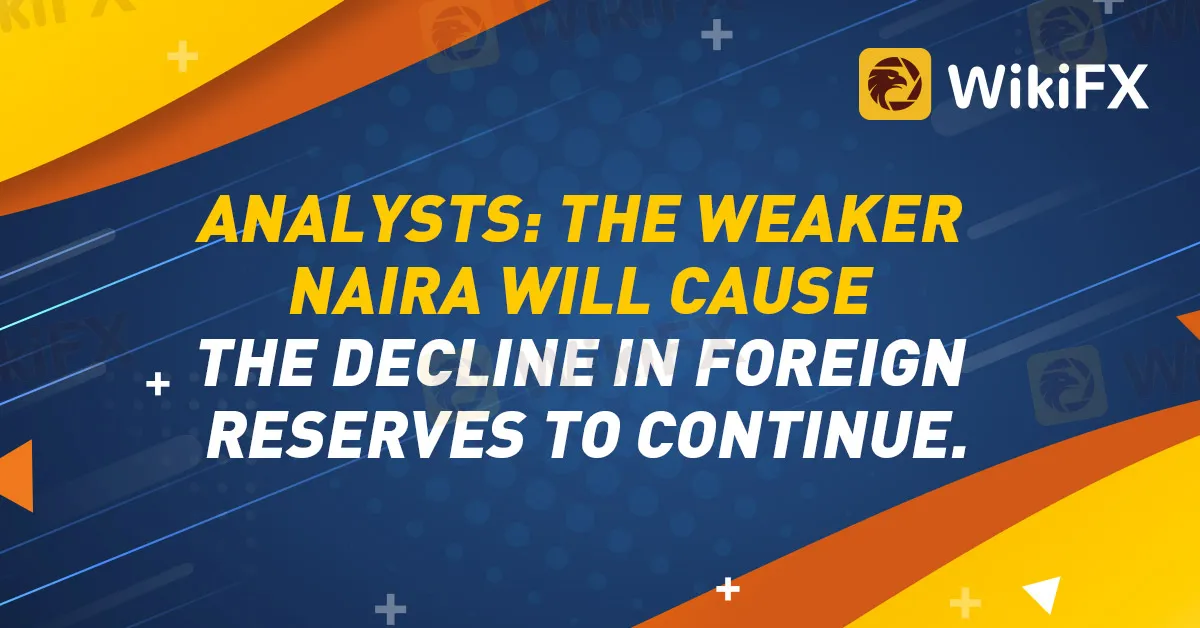简体中文
繁體中文
English
Pусский
日本語
ภาษาไทย
Tiếng Việt
Bahasa Indonesia
Español
हिन्दी
Filippiiniläinen
Français
Deutsch
Português
Türkçe
한국어
العربية
ANALYSTS: THE WEAKER NAIRA WILL CAUSE THE DECLINE IN FOREIGN RESERVES TO CONTINUE
Abstract:According to reports, it would take some time before Nigeria's foreign reserves start to recover from the recent fall.

According to reports, it would take some time before Nigeria's foreign reserves start to recover from the recent fall.
The Central Bank of Nigeria (CBN) released data on Monday showing that by March 23, 2023, Nigeria's FX reserves would have decreased by $93 million, or 2.53%, month over month.
According to the CBN, on February 23, 2023, FX reserves fell to $36.70 billion.
According to CBN data, the nation's FX reserves also decreased by 3.46 percent from the $37.06 billion they were on January 3, 2023, when the year began.
Due to Nigeria's failure to produce enough dollars to meet its needs, the largest economy in Africa has seen a fall in its dollar savings since last year.
Experts have ascribed the sustained decline of the naira value at all sectors of the dollar markets to the nation's ongoing loss of FX reserves.
The naira fluctuated between N750 and N770 last week on the black market, while it was quoted at N461.3 last week in the official Investors and Exporters' FX window (I&E), down from N461.8.
“This week, we expect to witness persistent pressure on the Naira across all market groups,” the experts at United Capital predict, given that FX headwinds will persist as dollar earnings remain low.
According to investment banking firm Cordros Capital, Nigeria's failure to expand its FX reserves and match the demand would endure over the short-to-medium term. There is no “good signal that suggests the pre-pandemic levels.”
The government's internal forex generation has continued to be undermined by low crude oil production and high premium motor spirit (PMS) under-recovery costs, while foreign portfolio investors (FPIs), who have historically supported supply levels in the official market, have stayed away because of the forex management policy.
The CBN said that it was confident that its many programs, the Naira-4-Dollar program, the RT-200 FX program, and other initiatives designed to promote remittances, would continue to improve the addition to external reserves and increase liquidity.
The rebate on both programs (the RT-200 FX program and the Naira-4-dollar program), in our opinion, is very unattractive to entice exporters and diasporans to the official window given between the official and illicit markets.
Foreign portfolio investment (FPI) and foreign direct investment (FDI) are currently at their lowest levels in more than five years, according to Afrinvest, thus the CBN should shift its attention to capital control regulations and the multiplicity of the currency window.
Despite the CBN's refusal to agree to the parallel market foreign currency rates, the majority of unmet US dollar demands from the official market are shifted to the parallel market. On the black market, the dollar to naira as reached 750 naira to the dollar. This represents an increase of 0.66 percent above the N755/$1 record set in session.
The International Air Transport Association estimates that foreign airlines are stuck with the CBN with $744 million (AITA).
Both producers and exporters have criticized the CBN for rationing.

Disclaimer:
The views in this article only represent the author's personal views, and do not constitute investment advice on this platform. This platform does not guarantee the accuracy, completeness and timeliness of the information in the article, and will not be liable for any loss caused by the use of or reliance on the information in the article.
Read more

New Zealand's FMA Warns Against "YouTube Crypto Investment Scam"
The Financial Markets Authority (FMA), New Zealand's financial regulator, warns individuals against investment scams that use YouTube channels to promote fraudulent cryptocurrency investment firms/websites. The authority explained on its official website how the YouTube cryptocurrency scam works, providing a step-by-step guide to help people recognize and avoid it. Read HOW THE SCAM WORKS and BE SAFE.

Trading is an Endless Journey
Every trader dreams of quick success, but rushing the process often leads to mistakes. It’s easy to get swept up in the excitement of winning trades or discouraged by unexpected losses. The truth is, mastering the emotional side of trading can be even more important than understanding market analysis or strategies.

WikiFX Review: Is FxPro Reliable?
Founded in 2006, FxPro is a reputable UK-based broker, trading on various market instruments. In this article, we will help you find the answer to one question: Is FxPro reliable?

Geopolitical Events: What They Are & Their Impact?
You've heard many times that geopolitical events have a significant impact on the Forex market. But do you know what geopolitical events are and how they affect the FX market? Let us learn about it today.
WikiFX Broker
Latest News
Two Californians Indicted for $22 Million Crypto and NFT Fraud
Macro Markets: Is It Worth Your Investment?
Trading is an Endless Journey
WikiFX Review: Is Ultima Markets Legit?
Colorado Duo Accused of $8M Investment Fraud Scheme
What Impact Does Japan’s Positive Output Gap Have on the Yen?
RM62k Lost Investment Scam After Joining XRP Community Malaysia on Telegram
Victims of Financial Fraud in France Suffer Annual Losses of at Least €500 Million
SEC Warns on Advance Fee Loan Scams in the Philippines
Malaysia Pioneers Zakat Payments with Cryptocurrencies
Currency Calculator


